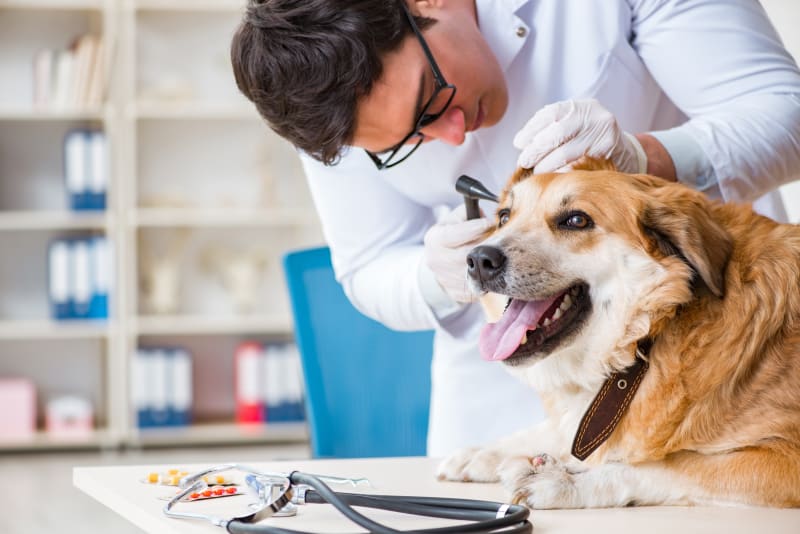Our Ventura vets frequently see Valley Fever in dogs who have spent time in the low desert regions of the southwestern United States. While healthy adult dogs may show no signs of this condition, puppies, senior dogs, and dogs with compromised immune systems can develop severe, often painful symptoms.
What is Valley Fever in dogs?
Coccidioidomycosis is a condition that affects both dogs and humans. It is also known as Valley Fever, desert rheumatism, San Joaquin Valley Fever, and California disease.
Coccidiodes immitis, a pathogenic fungus that lives in soil and thrives in specific desert climates, causes Valley fever. Coccidiodes immitis can be found in the low desert regions of Arizona, New Mexico, Texas, and California.
How is Valley Fever spread?
Valley fever spreads by inhaling Coccidiodes immitis (fungal) spores. When your dog inhales the spores, they develop into spherules in the lungs.
If your dog's immune system is strong and healthy, the body will 'wall off' the spherules and your pet will remain asymptomatic.
However, if your dog is very young, old, or has a weak immune system, the spherules will continue to grow until they burst, releasing hundreds of endospores that can spread throughout the lungs and other parts of your pet's body. At this point, the cycle will restart.
Is Valley Fever contagious in dogs?
Valley fever in dogs is not contagious. It can only be contracted by inhaling spores.
What are the most common symptoms of Valley Fever in dogs?
In the early stages, when the spherules are contained within the lungs, signs of Valley Fever in dogs typically include fever, dry cough, decreased appetite, and lethargy.
Once the fungal spores have spread to other parts of your dog's body, the symptoms can be severe. They including painful swollen joints, persistent fever, weight loss, eye inflammation, and blindness. Valley Fever can cause seizures in very rare cases if the fungus enters the brain.
If your dog is showing signs of Valley Fever, it is critical that you seek veterinary care as soon as possible to avoid serious health complications.
Is Valley Fever curable in dogs?
Many dogs recover well from Valley Fever if it is diagnosed and treated early. Dogs diagnosed with Valley Fever after the disease has spread to other parts of the body are more difficult to treat, and the disease can be fatal in some cases.
What is the treatment for Valley Fever in dogs?
Valley Fever in dogs is typically treated with antifungal medications. The length of time your dog will need to take these medications is determined by the severity of their condition.
In most cases, antifungal medications will need to be taken for 6-12 months, with symptoms often improving within a week or two. When Valley Fever spreads to other parts of the body, your dog may need to take antifungal medications for the rest of their life.
Ketoconazole (Nizoral®), itraconazole (Itrafungol® and Sporanox®), and fluconazole (Diflucan®) are some of the most common antifungal medications used to treat Valley Fever in dogs.
Note: The advice provided in this post is intended for informational purposes and does not constitute medical advice regarding pets. For an accurate diagnosis of your pet's condition, please make an appointment with your vet.
At Ventura vets have experience in the treatment of Valley Fever in dogs. If your dog is showing signs of Valley Fever contact us right away to book an appointment for your canine companion.
Looking for a veterinary specialist in Ventura?
We're always accepting new patients, so contact our veterinary hospital today to book your pet's first appointment.Related Articles View All
Anesthesia for Dogs
Most dogs are given anesthesia when they are spayed or neutered, and the majority of them will require it at least once throughout their lives. Our four-legged pets, like us, may require anesthesia as part of a surgery or procedure. Today, our Ventura vets discuss what you should know about anesthesia for dogs.
MRI for Dogs: How They Can Help
At Veterinary Medical and Surgical Group (VMSG) in Ventura, our board-certified veterinary neurologists use our in-house MRI to help diagnose a range of health issues in dogs from a ruptured cranial cruciate ligament to brain tumors. Today our vets explain why MRI scans for dogs can be helpful, and the conditions this technology can help diagnose.
FHO Surgery in Cats
FHO surgery can be an effective and relatively inexpensive surgical treatment option for hip problems in cats. Today, our Ventura vets describe the hip anatomy of cats, hip problems that could affect your kitty and what’s involved in FHO surgery and recovery.
Cataract Surgery in Dogs
Cataracts prevent light from reaching the retina of your dog, resulting in blurred vision and, ultimately, blindness. In today's blog, our Ventura veterinarians discuss the causes and symptoms of canine cataracts, as well as the surgery used to treat this eye condition.
Signs Your Pet Should See an Emergency Vet
Conditions that necessitate immediate medical attention in pets can arise in the same way that they do in humans. Ventura veterinarians explain when emergency care is necessary and what to do in those situations.

